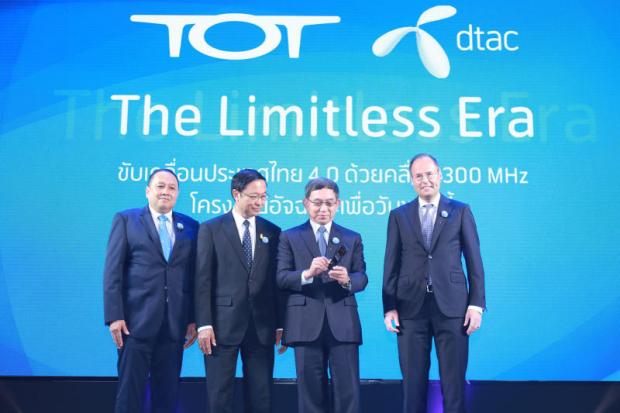
Total Access Communication (DTAC), the third-largest mobile operator, Thursday kicked off a soft launch for 4G service on TOT's 2300-megahertz spectrum with 10 base stations in Bangkok via its TriNet (DTN) subsidiary.
The stations are being used in an internal trial before a full commercial launch next month.
The company aims to roll out 4,000 base stations on the 2300MHz network to provide 4G service in 37 provinces by year-end, with nationwide coverage by 2019.
The move follows a partnership agreement recently signed by DTAC and TOT that lasts through 2025. DTN agreed to lease telecommunications equipment and domestic roaming service for the launch of the 4G LTE-TDD (long-term evolution-time division duplex) network, using 60MHz of bandwidth on TOT's 2300MHz spectrum.
Lars Norling, chief executive of DTAC, said the company plans to invest 15-18 billion baht this year to expand its existing 2100MHz spectrum and install 4,000 base stations for the 2300MHz spectrum.
"Acquiring 60MHz of bandwidth on the 2300MHz spectrum raises our competitiveness for mobile service as data usage rapidly increases in Thailand to over eight gigabytes per user per month," said Mr Norling.
DTAC operates on the 1800MHz spectrum under a 2G concession with CAT Telecom, which is due to expire on Sept 15.
DTAC also provides 4G service on 30MHz of bandwidth (upload and download) from the 2100MHz band under a licence from the telecom regulator.
Previously, DTAC failed to secure one of four licences from the 2015 auction -- two for the 1800MHz spectrum and two for the 900MHz spectrum.
Mr Norling said DTN will provide 4G mobile service with LTE-TDD technology that uses a single frequency band to transmit and receive data, allowing for greater utilisation of the spectrum, depending on data consumption.
It is the first time that 4G LTE-TDD will be used to provide mobile broadband and fixed wireless broadband service in Thailand.
TDD technology for mobile service has been adopted by 57 countries, including high growth markets like India and China, he said.
The 60MHz of bandwidth on the 2300MHz spectrum, the largest single block of spectrum in the country, allows for a downlink 3-5 times larger than existing spectrum blocks located on lower bandwidths.
Unlike TDD, frequency division duplex technology, which is used by other spectrum ranges operated by its rivals, needs two spectrum slots (upload and download) for utilisation -- one spectrum slot for transmitting data and another slot for receiving it.
Mr Norling said the TDD tech and massive MIMO (multiple-input and multiple-output) are key to 5G, which is why they have been labelled as 5G-ready by hardware manufacturers.
MIMO is a method for multiplying the capacity of a radio link using multiple transmitting and receiving antennas to exploit multipath propagation.
DTN is planning a commercial launch next month with a variety of promotional packages and bundling devices to offer greater capacity, speed and a smoother network.
DTAC and TOT Thursday conducted the soft launch at Intercontinental Hotel, with Deputy Prime Minister ACM Prajin Juntong in attendance.
Mr Norling declined to elaborate on how many new subscribers are expected to sign up after its commercial launch on the 2300MHz network.